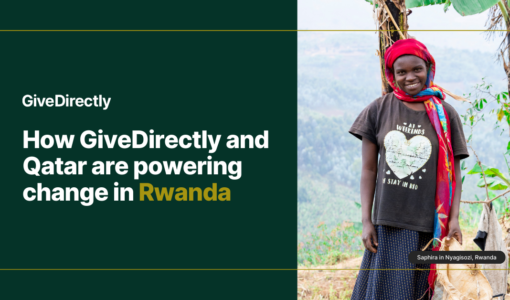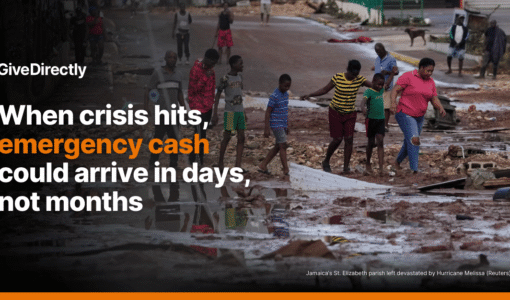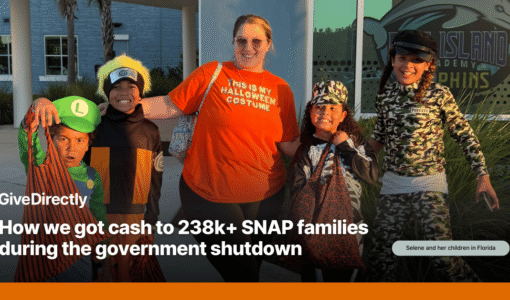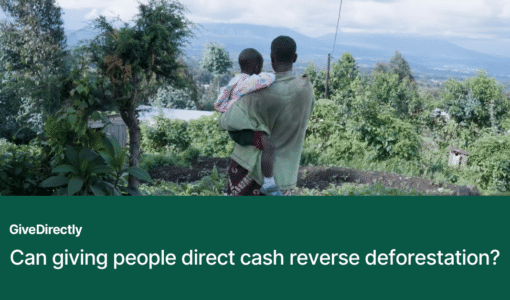Omidyar Network’s Tracy Williams and Mike Kubzansky describe why Omidyar is investing in GiveDirectly’s basic income experiment.
Omidyar Network’s foundational belief that empowering people frees them to better themselves, their families, and their communities has great evidence in the growing literature around the benefits of cash transfers. In these programs, low income individuals who receive cash benefits achieve remarkable outcomes in country after country: improvements in nutrition, household income, status of women, school attendance, and a range of other positive indicators.
Given this compelling fact base, it is clear that cash transfers have an important role to play in alleviating poverty and empowering people. In addition, they are at the crux of two other strategic development areas. First, they provide a strong use case for digitization of financial services, an essential first step toward a more inclusive financial system, as well as government transparency. In fact, driving the shift to digital payments with government to people (G2P) cash transfers is why we support the work of groups like the Better Than Cash Alliance.
Second, and more importantly, cash transfer programs can potentially help to address bigger issues facing our society, such as rising income volatility, lack of secure benefits, social instability, and the changing nature of work. Concerns around these themes have recently sparked growing attention to a particular form of cash transfer: the idea of universal basic income (UBI)—a transfer that would be regular, long-term, a meaningful amount, and available to everyone.
The idea of UBI is gaining traction as technology fundamentally changes the nature of work. In OECD and even middle-income countries like China, India, and Brazil, automation is replacing traditional jobs, while at the same time technology is enabling a new “gig economy,” which may make employment far less stable and reliable for supporting a livelihood. Similarly, in many poor countries—especially those in Africa—automation and globalization are creating the prospect of “premature deindustrialization,” where cheap labor isn’t drawing stable manufacturing jobs. This is especially worrying as that has been the primary road for countries to create better jobs and climb the income ladder in the past.
Existing social safety nets seem increasingly unsuited for these disruptions to work and income. The debate has taken off quickly, with advocates and detractors posing political and philosophical arguments. However, while the discussion has generated a lot of heat, it hasn’t produced very much light.
There is very little research and empirical evidence on how and when UBI could best be used. Even though we know that cash transfers in developing countries help reduce poverty and improve outcomes for families, these have not been tested on a long-term basis or with a universal beneficiary pool. And in the developed world, related concepts like negative income tax have been well studied, but not UBI itself. The existing evidence comes from several small-scale pilots, but no study to date has been conducted with sufficient size, rigor, timescale, or universality to truly test the impact of a full-fledged UBI program.
That is why we invested in GiveDirectly, one of the leading organizations in the field of unconditional cash transfers. Their researchers have run randomized controlled trials and published peer-reviewed studies, demonstrating that simply giving people money works. Now, GiveDirectly is running a 12-year UBI pilot in Kenya. This is the most ambitious UBI experiment in history: GiveDirectly will make cash transfers to more than 26,000 people in 200 villages in Kenya, with about 6,000 of those people receiving a long-term basic income for 12 years. And with payments of $0.75 per day—or 50 percent of typical adult income in rural Kenya where the trial is located—the amounts are significant to recipients.
Partnering with top economists (reviewed by their institutional review boards) at Princeton and MIT, GiveDirectly is ensuring the experiment is carried out with scientific rigor and responsibly, generating evidence to help answer critical questions on the impact of UBI, such as:
- How will UBI shape incentives for risk-taking, entrepreneurship, investment, and consumption?
- Would beneficiaries stop working? Would they take this opportunity to get trained for better work?
- Would they use the money to gamble or buy alcohol and drugs? (existing evidence strongly suggests the answer is “no”)
- Does lump sums versus regular payments impact recipients’ decision-making and social outcomes?
- What are the implications for education, health, and other public needs?
- What do these learnings mean for future policy and aid programs?
The best part of this experiment is that we won’t have to wait 12 years for answers. In the first few years GiveDirectly will already be able to produce insights on how people behave when they have confidence in long-term, “no-strings-attached” income.
Initial cash transfers have already kicked off in one village in Kenya. As the project continues, it will yield insights unlike those of any past study and provide evidence-based arguments to shed light on the discussions around the future of work and poverty alleviation policies.
While we don’t know what the right answer will be, or whether UBI will prove useful or feasible, this is an important first step on generating data, so that policymakers can make informed decisions. Emphasis on the word “first.” GiveDirectly’s pilot in Kenya is geographically-specific and focuses more on the issues around poverty alleviation than questions about jobs displaced by technological change. As such, Omidyar Network will look to support additional studies on UBI to diversify the growing body of research across markets, conditions, and formats. We hope that others will join us in doing the same.
For now, however, we are excited to witness the potential transformative impact of this experiment on the thousands of Kenyans participating in the project. We hope that with this opportunity, they will be empowered to find ways to best improve their own lives and livelihoods.



